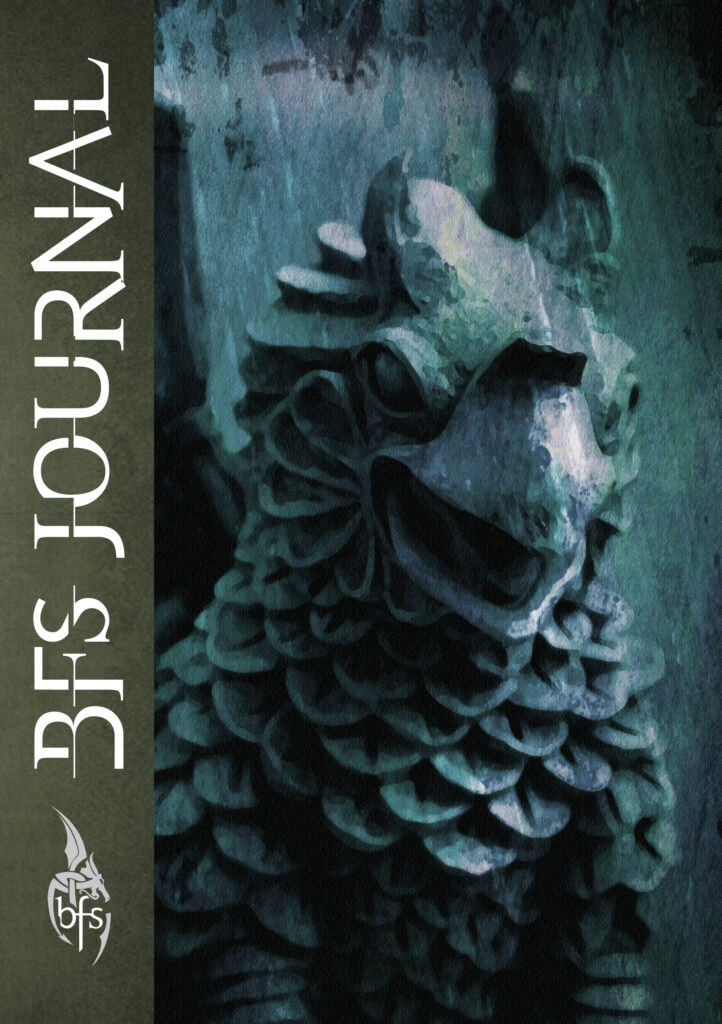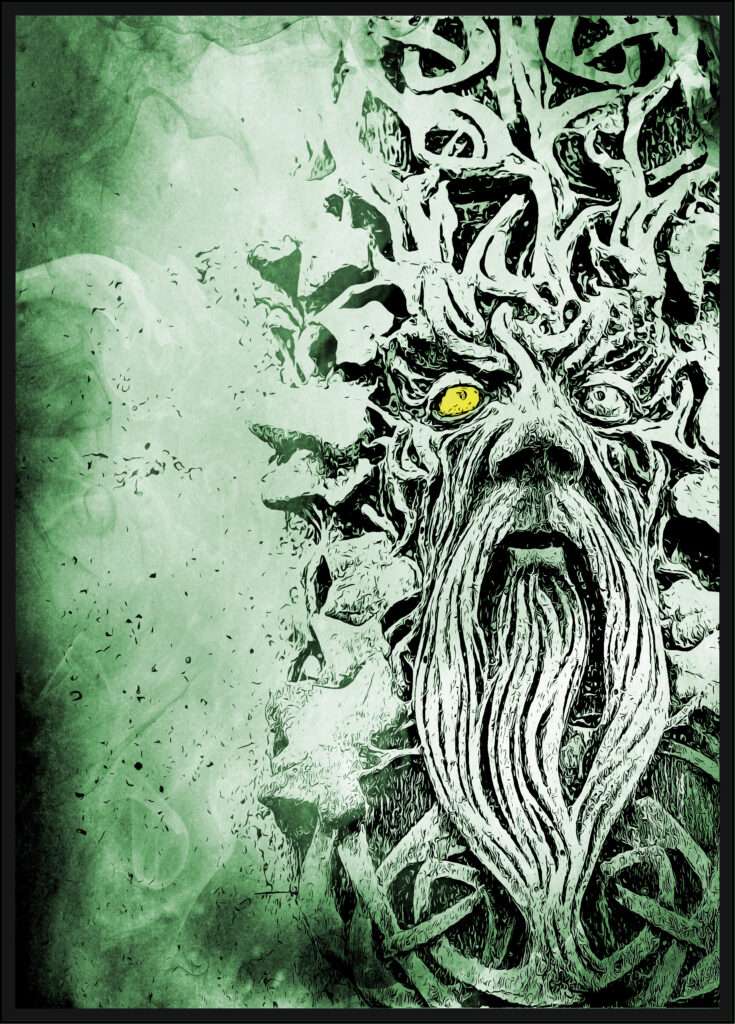Features and non-fiction
Editor: Kevan Manwaring

British Fantasy Society Journal – Call for Submissions for Winter Issue 2025
BFS Journal #27 Winter 2025
Call for Submissions: War in Fantasy
In this special issue we take a hard look at War in Fantasy. Conflict, from skirmishes to mass battles, tavern brawls to planet-wide apocalypses, is a staple of Fantasy: The Battle of the Five Armies in LOTR, The Last Battle in Narnia, The War in Heaven by Charles Williams, and Lyra Belacqua’s fight against death and the consciousness-stifling strictures of the Magisterium, are a few examples. In Warhammer 40K, which expanded the original Fantasy table-top wargame into the far future, we learn ‘in the grim darkness of the far future there is only war.’ There are very few large-scale Fantasy texts that do not acknowledge the impact of war in some way, whether through invasion, siege, massacre, colonisation, spoils of war, legacy, or trauma. Protagonists and places are scarred by it. Narratives are often prominently ante-, para-, or postbellum. Powerful weapons – key to victory or defeat, depending on whose hands they fall into – their acquisition and mastery, are the MacGuffins that drive plot. But does the prevalence of conflict in Fantasy normalise violence and even perpetuate it, or does it offer a useful mirror, allowing us to have a perspective on real-world conflict, narrativize trauma and learn to overcome it? Articles on any of these aspects are welcome. Here are some suggestions:
- The influence of the First World War on Tolkien’s Middle Earth.
- Early depictions of war in taproot texts such as Beowulf.
- Changing depictions of warfare in 21st Century Fantasy.
- Warfare between the human and the other-than-human.
- Hidden, supernatural wars.
- The depiction of non-western cultures in Fantasy warfare.
- Portrayal of marginal figures in warfare, e.g., scavengers; servants; animals.
- The impact of warfare on urban and rural settings in Fantasy.
- Magic in warfare.
- Historical influences on depictions of warfare in Fantasy, e.g. armour, weaponry, tactics.
- Parleys, peace treaties, truces, ceasefires, and the cessation of conflict.
- The aftermath of war in Fantasy texts.
- Valkyries, Morrigans, and other psychopompic figures in warfare.
- Visions in conflict and haunted battlefields.
Submissions should be clearly titled as follows: SURNAME_TITLE_BFSJOURNAL_CFP_WINTER2025. A 200-word abstract and 100-word author bio should be included. Work needs to original, previously unpublished, and referenced using the Harvard author/date system. The editor retains the right to edit any submission, and contributors must be willing to address any editorial suggestions within good time. Publication is expected December 2025.
For full submission guidelines please refer to the checklist below.
Deadline for ABSTRACTS: 31st August 2025.
Deadline for ARTICLES (if abstract is accepted): 31st October 2025.
Send to The Editor: bfsjournal@britishfantasysociety.org
About the Journal
BFS Journal is a biannual periodical devoted to scholarly reflections on aspects of Fantasy (including Horror, Weird, and other forms of imaginative literature).
We are looking for well-researched, critical articles on aspects of Fantasy (see call for submissions), reviews (retro, or recent publications including novels, short story collections, graphic novels, films, television, stage plays, TTRPGs, computer games, podcasts, and emergent forms), convention and conference reports, well-written letters discussing Fantasy, celebrations and obituaries of key figures in the Fantasy community, and original artwork.
We do suggest you contact us before writing any substantial article, to check on suitability and word count (for academic articles submit a 200-word abstract and 100-word bionote). Our readers are generally knowledgeable when it comes to fantasy, so don’t be afraid to suggest topics slightly off the beaten track. Hybrid submissions such as ficto-criticism, creative criticism, and ‘rebellious research’ approaches especially welcome.
Academic articles for the BFS Journal should be between 4000 and 8000 words. References in the text should be written using the Harvard notes and bibliography system for the Arts and Humanities (Author, Year of Publication) with a full publication listing for the bibliography given for each article at the end. Please don’t use footnotes in your submissions.
Supply any images as separate files. Use letters in the filenames to indicate the preferred order (e.g. a-arrival.jpg, b-conversation.jpg, c-departure.jpg). Original artwork, photographs, and cartoons are welcome as long as you own the copyright. AI-generated work will not be considered.
Publishers should note that we are always on the lookout for suitable people to interview. We might also be interested in providing our readers with previews of forthcoming non-fiction titles.
BFS Journal is always open to queries, pitches, and submissions, although those responding to specific calls for submission will be given priority. Please familiarise yourself with the Journal before submitting, and bear in mind the specialist audience it is catering for. However, well-written submissions that consider connections between disciplines, genres, audiences, contemporary issues, etc, will always be considered.
Letters to the Editor
We are always interested in publishing correspondence from BFS members, on any aspect of the society, not just the BFS Journal itself.

BFS Journal Submission Guidelines
Scholarly articles are welcome that have been drafted in accordance with the following guidelines:
- Fully-referenced articles using the Harvard notes and bibliography system on the theme of the issue (see Calls for Papers) of 4000-8000 words.
- Reviews of Fantasy in novels, novella, short stories, interaction fiction, TV drama, film, radio, theatrical production, table-top role-playing games, computer games, podcast, graphic novel, etc of 500-1000 words.
- All submissions should be in Times New Roman, 12-point font, double-spaced, standard margins.
- Title and any subtitle should be in bold.
- Beneath the title place your name, also in bold.
- Follow this with the Abstract (200-words).
- Under the Abstract add 5 key-words.
- Add your surname and title in the Header.
- Add page numbers to the Footer.
- After the main text add a 100-word bio-note.
- If it is an Article, add the Notes and Bibliography.
- Add the word count to the end.
- Send as an editable Word docx.
- Title your file SURNAME_TITLE_WINTER_2024 (or whatever relevant issue).
- In the submission email include the title and brief summary of your submission, plus clearly identify yourself as the author, and if appropriate, your BFS membership number, other affiliations, and any previous publications. State whether the submission for consideration is original and unpublished. Work that has been previously published in any form will not be considered.
- Articles and reviews that follow these submission guidelines will be acknowledged on receipt, although please note this is not a guarantee of inclusion, just a courtesy. Those who do not, e.g., generic blanket submissions, will be ignored. If we wish to proceed with your piece, you will receive editorial feedback within one month of the deadline for submissions. You will have 14 days to make any initial changes, then a further 14 days for any final changes. You will be asked to sign-off the proof copy before we go to press (within 5 days). Failure to act upon editorial feedback and meet this production schedule will mean your work will no longer be included, although we may consider it again if an appropriate issue occurs.
- The editor/s reserve the right to make any changes to make the submission suitable for publication, including the removal of inappropriate language and incorrect formatting, although you will be initially requested to do this yourself.
- Usage of any submission will be in accordance with BFS policy.
- Submissions to be sent to The Editor: bfsjournal@britishfantasysociety.org
